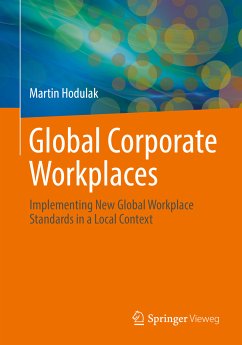In recent years, multinational corporations were increasingly engaged in the development of standardized global workplace models. For their implementation and feasibility, it is decisive as how these standards fit the diverse regional workplace cultures. This topic was pursued in the course of a research project, comparing established workplaces in Germany, USA and Japan against global workplace standards of multinational corporations.
The analysis confirmed the expected differences among local workplaces and on the other hand a predominant mainstream among global corporate workplace standards. Conspicuous however, are the fundamental differences between local models and corporate standards. For the implementation of global standards in local context, this implies multiple challenges on cultural, organizational and spatial level. The analysis findings provide information for assessing current projects and pinpointing optimization measures. The analysis framework further provides a tool to uncover and assess needs and restrictions for the development of future workplace models.
The content
- Holistic approach raises awareness for complexity of workplace models
- Provides comprehensive framework to ensure that all aspects are considered
- Supplies reference information and guide values to ensure credibility in project proceedings
- Describes approach, methodology and guidelines to set up and to conduct projects
The author
Martin Hodulak is a workplace strategy and facility programming consultant, providing services to government and commercial clients. Over the past 18 years, he has been leading and conducting more than 70 projects on workplace strategies, workplace design and facility programming. Among them are commissions for automotive, pharmaceutical and IT industries, as well as forgovernmental institutions and higher education facilities.
Apart from project work, he has been refining methodologies for programming and workplace design and has co-authored the first programming guidebook for the German market (Hodulak, M. and Schramm, U. Nutzerorientierte Bedarfsplanung - Springer Verlag, 2011). He has lectured on workplace strategies and programming, and is published in national and international conference proceedings.
He was trained as an architect at the University of Karlsruhe and the University of Bath and holds a PhD from the University of Stuttgart. In recent years, he has worked as a project leader, senior consultant and managing director for various architectural and consulting practices.
Dieser Download kann aus rechtlichen Gründen nur mit Rechnungsadresse in A, B, BG, CY, CZ, D, DK, EW, E, FIN, F, GR, HR, H, IRL, I, LT, L, LR, M, NL, PL, P, R, S, SLO, SK ausgeliefert werden.
Es gelten unsere Allgemeinen Geschäftsbedingungen: www.buecher.de/agb
Impressum
www.buecher.de ist ein Internetauftritt der buecher.de internetstores GmbH
Geschäftsführung: Monica Sawhney | Roland Kölbl | Günter Hilger
Sitz der Gesellschaft: Batheyer Straße 115 - 117, 58099 Hagen
Postanschrift: Bürgermeister-Wegele-Str. 12, 86167 Augsburg
Amtsgericht Hagen HRB 13257
Steuernummer: 321/5800/1497
USt-IdNr: DE450055826
Bitte wählen Sie Ihr Anliegen aus.
Rechnungen
Retourenschein anfordern
Bestellstatus
Storno









